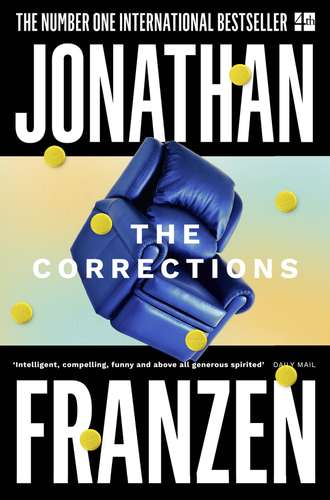
Полная версия
The Corrections
He went to his dining table and confirmed the absence of dregs in the wine bottles on it. He’d used the last $220 of credit on his Visa card to buy eight bottles of a rather tasty Fronsac, and on Saturday night he’d thrown one last dinner party to rally his supporters on the faculty. A few years ago, after D——’s drama department had fired a popular young professor, Cali Lopez, for having claimed to have a degree she didn’t have, outraged students and junior faculty had organized boycotts and candlelight vigils that had forced the college not only to rehire Lopez but to promote her to full professor. Granted, Chip was neither a lesbian nor a Filipina, as Lopez was, but he’d taught Theory of Feminism, and he had a hundred-percent voting record with the Queer Bloc, and he routinely packed his syllabi with non-Western writers, and all he’d really done in Room 23 of the Comfort Valley Lodge was put into practice certain theories (the myth of authorship; the resistant consumerism of transgressive sexual (trans)act(ion)s) that the college had hired him to teach. Unfortunately, the theories sounded somewhat lame when he wasn’t lecturing to impressionable adolescents. Of the eight colleagues who’d accepted his invitation for dinner on Saturday, only four had shown up. And despite his efforts to steer the conversation around to his predicament, the only collective action his friends had taken on his behalf had been to serenade him, as they killed the eighth bottle of wine, with an a capella rendition of “Non, Je Ne Regrette Rien.”
He hadn’t had the strength to clear the table in the intervening days. He considered the blackened red leaf lettuce, the skin of congealed grease on an uneaten lamb chop, the mess of corks and ashes. The shame and disorder in his house were like the shame and disorder in his head. Cali Lopez was now the college’s acting provost, Jim Leviton’s replacement.
Tell me about your relationship with your student Melissa Paquette.
My former student?
Your former student.
I’m friendly with her. We’ve had dinner. I spent some time with her at the beginning of Thanksgiving break. She’s a brilliant student.
Did you give Melissa any help with a paper she wrote last week for Vendla O’Fallon?
We talked about the paper in a general way. She had some areas of confusion that I was able to help her clear up.
Is your relationship with her sexual?
No.
Chip, what I think we’ll do is suspend you with pay until we can have a full hearing. That’s what we’ll do. We’ll have a hearing early next week, and in the meantime you should probably get a lawyer and talk to your union rep. I also have to insist that you not speak to Melissa Paquette.
What does she say? That I wrote that paper?
Melissa violated the honor code by handing in work that was not her own. She’s facing a one-semester suspension, but we understand that there are mitigating factors. For example, your grossly inappropriate sexual relationship with her.
That’s what she says?
My personal advice, Chip, is resign now.
That’s what she says?
You have no chance.
The snowmelt was raining down harder on his patio. He lit a cigarette on the front burner of his stove, took two painful drags, and pressed the coal into the palm of his hand. He groaned through clenched teeth and opened his freezer and put his palm to its floor and stood for a minute smelling flesh smoke. Then, holding an ice cube, he went to the phone and dialed the ancient area code, the ancient number.
While the phone rang in St. Jude, he planted a foot on the section of Times in his trash and mashed it down deeper, got it out of sight.
“Oh, Chip,” Enid cried, “he’s already gone to bed!”
“Don’t wake him,” Chip said. “Just tell him—”
But Enid set the phone down and shouted Al! Al! at volumes that diminished as she moved farther from the phone and up the stairs toward the bedrooms. Chip heard her shout, It’s Chip! He heard their upstairs extension click into action. He heard Enid instructing Alfred, “Don’t just say hello and hang up. Visit with him a little.”
There was a rustling transfer of the receiver.
“Yes,” Alfred said.
“Hey, Dad, happy birthday,” Chip said.
“Yes,” Alfred said again in exactly the same flat voice.
“I’m sorry to call so late.”
“I was not asleep,” Alfred said.
“I was afraid I woke you up.”
“Yes.”
“Well, so happy seventy-fifth.”
“Yes.”
Chip hoped that Enid was motoring back down to the kitchen as fast as she could, ailing hip and all, to bail him out. “I guess you’re tired and it’s late,” he said. “We don’t have to talk.”
“Thank you for the call,” Alfred said.
Enid was back on the line. “I’m going to finish these dishes,” she said. “We had a party here tonight! Al, tell Chip about the party we had! I’m getting off the phone now.”
She hung up. Chip said, “You had a party.”
“Yes. The Roots were here for dinner and bridge.”
“Did you have a cake?”
“Your mother made a cake.”
The cigarette had made a hole in Chip’s body through which, he felt, painful harms could enter and vital factors painfully escape. Melting ice was leaking through his fingers. “How was the bridge?”
“My typical terrible cards.”
“That doesn’t seem fair on your birthday.”
“I imagine,” Alfred said, “that you are gearing up for another semester.”
“Right. Right. Although actually not. Actually I’m deciding not to teach at all this semester.”
“I didn’t hear.”
Chip raised his voice. “I said I’ve decided not to teach this semester. I’m going to take the semester off and work on my writing.”
“My recollection is that you are due for tenure soon.”
“Right. In April.”
“It seems to me that a person hoping to be offered tenure would be advised to stay and teach.”
“Right.”
“If they see you working hard, they will have no reason not to offer you tenure.”
“Right. Right.” Chip nodded. “At the same time, I have to prepare for the possibility that I won’t get it. And I’ve got a, uh. A very attractive offer from a Hollywood producer. A college friend of Denise’s who produces movies. Potentially very lucrative.”
“A great worker is almost impossible to fire,” Alfred said.
“The process can get very political, though. I have to have alternatives.”
“As you wish,” Alfred said. “However, I’ve found that it’s usually best to choose one plan and stick with it. If you don’t succeed here, you can always do something else. But you’ve worked many years to reach this point. One more semester’s hard work won’t hurt you.”
“Right.”
“You can relax when you have tenure. Then you’re safe.”
“Right.”
“Well, thank you for the call.”
“Right. Happy birthday, Dad.”
Chip dropped the phone, left the kitchen, and took a Fronsac bottle by the neck and brought its body down hard on the edge of his dining table. He broke a second bottle. The remaining six he smashed two at a time, a neck in each fist.
Anger carried him through the difficult weeks that followed. He borrowed ten thousand dollars from Denise and hired a lawyer to threaten to sue D—— College for wrongful termination of his contract. This was a waste of money, but it felt good. He went to New York and ponied up four thousand dollars in fees and deposits for a sublet on Ninth Street. He bought leather clothes and had his ears pierced. He borrowed more money from Denise and reconnected with a college friend who edited the Warren Street Journal. He conceived revenge in the form of a screenplay that would expose the narcissism and treachery of Melissa Paquette and the hypocrisy of his colleagues; he wanted the people who’d hurt him to see the movie, recognize themselves, and suffer. He flirted with Julia Vrais and asked her on a date, and soon he was spending two or three hundred dollars a week to feed and entertain her. He borrowed more money from Denise. He hung cigarettes on his lower lip and banged out a draft of a script. Julia in the back seat of cabs pressed her face against his chest and clutched his collar. He tipped waiters and cabbies thirty and forty percent. He quoted Shakespeare and Byron in funny contexts. He borrowed more money from Denise and decided that she was right, that getting fired was the best thing that had ever happened to him.
He wasn’t so naïve, of course, as to take Eden Procuro’s professional effusions at face value. But the more he saw of Eden socially, the more confident he became that his script would get a sympathetic reading. For one thing, Eden was like a mother to Julia. She was only five years older, but she’d undertaken a wholesale recalibration and improvement of her personal assistant. Although Chip never quite shook the feeling that Eden was hoping to cast someone else in the role of Julia’s love interest (she habitually referred to Chip as Julia’s “escort,” not her “boyfriend,” and when she talked about Julia’s “untapped potential” and her “lack of confidence” he suspected that mate selection was one area in which she hoped to see improvement in Julia), Julia assured him that Eden thought he was “really dear” and “extremely smart.” Certainly Eden’s husband, Doug O’Brien, was on his side. Doug was a mergers-and-acquisitions specialist at Bragg Knuter & Speigh. He’d set Chip up with a flextime proofreading job and had seen to it that Chip was paid the top hourly wage. Whenever Chip tried to thank him for this favor, Doug made pshawing motions with his hand. “You’re the man with the Ph.D.,” he said. “That book of yours is scary smart stuff.” Chip had soon become a frequent guest at the O’Brien-Procuros’ dinner parties in Tribeca and their weekend house parties in Quogue. Drinking their liquor and eating their catered food, he had a foretaste of a success a hundred times sweeter than tenure. He felt that he was really living.
Then one night Julia sat him down and said there was an important fact that she hadn’t mentioned earlier, and would he promise not to be too mad at her? The important fact was that she sort of had a husband. The deputy prime minister of Lithuania—a small Baltic country—was a man named Gitanas Misevi

Her problem with men, she said, was that she’d grown up without. Her father was a manic-depressive boat salesman whom she remembered meeting once and wished she’d never met at all. Her mother, a cosmetics-company executive, had fobbed Julia off on her own mother, who’d enrolled her in a Catholic girls’ school. Julia’s first significant experience with men was at college. Then she moved to New York and embarked on the long process of sleeping with every dishonest, casually sadistic, terminally uncommitted really gorgeous guy in the borough of Manhattan. By the age of twenty-eight, she had little to feel good about except her looks, her apartment, and her steady job (which mainly consisted, however, of answering the phone). So when she met Gitanas at a club and Gitanas took her seriously, and by and by produced an actual not-small diamond in a white-gold setting, and seemed to love her (and the guy was, after all, an honest-to-God ambassador to the United Nations; she’d gone and heard him do his Baltic thundering at the General Assembly), she did her level best to repay his kindness. She was As Agreeable As Humanly Possible. She refused to disappoint Gitanas even though, in hindsight, it probably would have been better to disappoint him. Gitanas was quite a bit older and fairly attentive in bed (not like Chip, Julia hastened to say, but not, you know, terrible), and he seemed to know what he was doing with the marriage thing, and so one day she went to City Hall with him. She might even have gone by “Mrs. Misevi

Anyway, that was the story of her and Gitanas, and she hoped that Chip wouldn’t be too mad at her.
And Chip was not. Indeed, at first he not only didn’t mind that Julia was married, he adored the fact. He was fascinated by her rings; he talked her into wearing them in bed. Down at the offices of the Warren Street Journal, where he sometimes felt insufficiently transgressive, as if his innermost self were still a nice midwestern boy, he took pleasure in alluding to the European statesman he was “cuckolding.” In his doctoral thesis (“Doubtful It Stood: Anxieties of the Phallus in Tudor Drama”) he’d written extensively about cuckolds, and under the cloak of his reproving modern scholarship he’d been excited by the idea of marriage as a property right, of adultery as theft.
Before long, though, the thrill of poaching on the diplomat’s preserve gave way to bourgeois fantasies in which Chip himself was Julia’s husband—her lord, her liege. He became spasmodically jealous of Gitanas Misevi

After New Year’s, Chip returned to his rough draft of “The Academy Purple,” which he’d completed in a euphoric twenty-page blaze of keyboard-pounding, and discovered that it had a lot of problems. It looked, in fact, like incoherent hackwork. During the month that he’d spent expensively celebrating its completion, he’d imagined that he could remove certain hackneyed plot elements—the conspiracy, the car crash, the evil lesbians—and still tell a good story. Without these hackneyed plot elements, however, he seemed to have no story at all.
In order to salvage his artistic and intellectual ambitions, he added a long theoretical opening monologue. But this monologue was so unreadable that every time he turned on his computer he had to go and tinker with it. Soon he was spending the bulk of each work session compulsively honing the monologue. And when he despaired of shortening it any further without sacrificing important thematic material, he started fussing with the margins and hyphenation to make the monologue end at the bottom of page 6 rather than the top of page 7. He replaced the word “continue” with “go on” to save three spaces, thus allowing the word “(trans)act(ion)s” to be hyphenated after the second t, which triggered a whole cascade of longer lines and more efficient hyphenations. Then he decided that “go on” had the wrong rhythm and that “(trans)act(ion)s” should not be hyphenated under any circumstances, and so he scoured the text for other longish words to replace with shorter synonyms, all the while struggling to believe that stars and producers in Prada jackets would enjoy reading six pages (but not seven!) of turgid academic theorizing.
Once, when he was a boy, there was a total eclipse of the sun in the Midwest, and a girl in one of the poky towns across the river from St. Jude had sat outside and, in defiance of myriad warnings, studied the dwindling crescent of the sun until her retinas combusted.
“It didn’t hurt at all,” the blinded girl had told the St. Jude Chronicle. “It felt like nothing.”
Each day that Chip spent grooming the corpse of a dramatically dead monologue was a day in which his rent and food and entertainment expenses were paid for, in large part, with his little sister’s money. And yet as long as the money lasted, his pain was not acute. One day led to another. He rarely got out of bed before noon. He enjoyed his food and his wine, he dressed well enough to persuade himself that he was not a quivering gelatinous mess, and he managed, on four out of five evenings, to hide the worst of his anxiety and foreboding and enjoy himself with Julia. Because the sum he owed Denise was large in comparison to his proofreading wage but small by Hollywood standards, he worked less and less at Bragg Knuter & Speigh. His only real complaint was with his health. On a summer day when his work session consisted of rereading Act I, being struck afresh by its irredeemable badness, and hurrying outside to get some air, he might walk down Broadway and sit on a bench at Battery Park City and let the breeze off the Hudson flow under his collar, and listen to the ceaseless fut-fut of copter traffic and the distant shouts of millionaire Tribeca toddlers, and be overcome with guilt. To be so vigorous and healthy and yet so nothing: neither taking advantage of his good night’s sleep and his successful avoidance of a cold to get some work done, nor yet fully entering into the vacation spirit and flirting with strangers and knocking back margaritas. It would have been better, he thought, to do his getting sick and dying now, while he was failing, and save his health and vitality for some later date when, unimaginable though the prospect was, he would perhaps no longer be failing. Of all the things he was wasting—Denise’s money, Julia’s goodwill, his own abilities and education, the opportunities afforded by the longest sustained economic boom in American history—his sheer physical well-being, there in the sunlight by the river, hurt the worst.
He ran out of money on a Friday in July. Facing a weekend with Julia, who could cost him fifteen dollars at a cinema refreshments counter, he purged the Marxists from his bookshelves and took them to the Strand in two extremely heavy bags. The books were in their original jackets and had an aggregate list price of $3,900. A buyer at the Strand appraised them casually and delivered his verdict: “Sixty-five.”
Chip laughed in a breathy way, willing himself not to argue; but his U.K. edition of Jürgen Habermas’s Reason and the Rationalization of Society, which he’d found too difficult to read, let alone annotate, was in mint condition and had cost him £95.00. He couldn’t help pointing this out by way of example.
“Try somewhere else, if you like,” the buyer said, his hand hesitating above the cash register.
“No, no, you’re right,” Chip said. “Sixty-five is great.”
It was pathetically obvious that he’d believed his books would fetch him hundreds of dollars. He turned away from their reproachful spines, remembering how each of them had called out in a bookstore with a promise of a radical critique of late-capitalist society, and how happy he’d been to take them home. But Jürgen Habermas didn’t have Julia’s long, cool, pear-tree limbs, Theodor Adorno didn’t have Julia’s grapy smell of lecherous pliability, Fred Jameson didn’t have Julia’s artful tongue. By the beginning of October, when Chip sent his finished script to Eden Procuro, he’d sold his feminists, his formalists, his structuralists, his poststructuralists, his Freudians, and his queers. To raise money for lunch for his parents and Denise, all he had left was his beloved cultural historians and his complete hardcover Arden Shakespeare; and because a kind of magic resided in the Shakespeare—the uniform volumes in their pale blue jackets were like an archipelago of safe retreats—he piled his Foucault and Greenblatt and hooks and Poovey into shopping bags and sold them all for $115.
He spent sixty dollars on a haircut, some candy, a stain-removal kit, and two drinks at the Cedar Tavern. Back in August, when he’d invited his parents, he’d hoped that Eden Procuro might have read his script and advanced him money before they arrived, but now the only accomplishment and the only gift he had to offer was a home-cooked meal. He went to an East Village deli that sold reliably excellent tortellini and crusty bread. He was envisioning a rustic and affordable Italian lunch. But the deli appeared to have gone out of business, and he didn’t feel like walking ten blocks to a bakery that he was certain had good bread, and so he wandered the East Village randomly, trudging in and out of meretricious food stores, hefting cheeses, rejecting breads, examining inferior tortellini. Finally he abandoned the Italian idea altogether and fixed on the only other lunch he could think of—a salad of wild rice, avocado, and smoked turkey breast. The problem then was to find ripe avocados. In store after store he found either no avocados or walnut-hard avocados. He found ripe avocados that were the size of limes and cost $3.89 apiece. He stood holding five of them and considered what to do. He put them down and picked them up and put them down and couldn’t pull the trigger. He weathered a spasm of hatred of Denise for having guilted him into inviting his parents to lunch. He had the feeling that he’d never eaten anything in his life but wild-rice salad and tortellini, so blank was his culinary imagination.
Around eight o’clock he ended up outside the new Nightmare of Consumption (“Everything—for a Price!”) on Grand Street. A humidity had stolen over the sky, a sulfurous uneasy wind from Rahway and Bayonne. The supergentry of SoHo and Tribeca were streaming through the Nightmare’s brushed-steel portals. The men came in various shapes and sizes, but all the women were slim and thirty-six; many were both slim and pregnant. Chip had a collar rash from his haircut and felt unready to be seen by so many perfect women. But right inside the Nightmare’s door he glimpsed a box of greens marked SORREL from Belize $0.99.
He entered the Nightmare, snagged a basket, and put one bunch of sorrel in it. Ninety-nine cents. Installed above the Nightmare’s coffee bar was a screen that gave running ironic tallies of TODAY’S GROSS RECEIPTS and TODAY’S PROFIT and PROJECTED QUARTERLY PER-SHARE DIVIDEND (Unofficial Non-Binding Estimate Based on Past Quarterly Performances / This Information Provided for Entertainment Purposes Only), and COFFEE SALES THIS STATION. Chip wove among strollers and cell phone antennae to the fish counter, where, as in a dream, he found WILD NORWEGIAN SALMON, LINE CAUGHT on sale at a reasonable price. He pointed at a midsize filet, and to the fishman’s question, “What else?” he replied in a crisp tone, almost a smug tone, “That’ll do it.”








